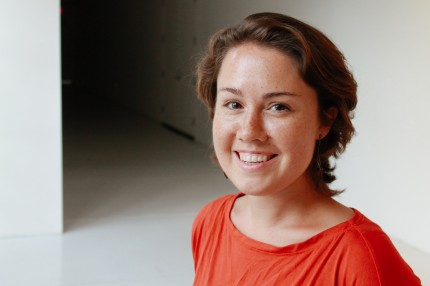Caroline Shaw’s music given superb advocacy by Chicago Q Ensemble
Chicago Q Ensemble‘s performance Sunday night at Constellation was the very model of a contemporary chamber music concert—one of those evenings when listeners could sit back and relax, knowing they were in extremely capable hands.
It was all the more satisfying since the repertoire wasn’t old favorites by Mozart or Beethoven but six barely known chamber pieces by Caroline Shaw, the young New York-based composer who won the Pulitzer Prize for Music in 2013.
Constellation is a hip, comfortable space on Western Avenue just south of Belmont, and Chicago Q’s concert was part of the club’s weekly Sunday contemporary music series titled “Frequency.” The goal is to present experimental and new music in a laid-back atmosphere, dispensing with the formality of standard chamber music performances. Presented in Constellation’s intimate, white-box theater, a space with good acoustics and clear sight lines, the concert surpassed that ambitious goal.
Coming up on its 5th anniversary, Chicago Q Ensemble—–violinist Ellen McSweeney, violist Aimee Biasiello and cellist Sara Sitzer—–invited Brooklyn-based violist Anne Lanzilotti to join them for Sunday’s 90-minute concert.
Shaw’s music is a beguiling combination of the familiar and the bracingly unusual. One of the pieces, Punctum, a string quartet written in 2009 and revised in 2013, wove a famous Bach chorale tune into a texture of urgent, oscillating rhythms and fierce pizzicato outbursts. Boris Kerner, a darkly ardent piece from 2012, may be the world’s first composition for solo cello and tuned flower pots.
The overall mood was casual. Sitzer’s comments about each piece were informative and witty, and before Punctum, Lanzilotti led the willing audience in a sing-along of the Bach chorale tune (best known as the hymn “O sacred head surrounded”) complete with four-part harmony.
But there was nothing faintly casual about the musicians’ approach to Shaw’s demanding yet appealing music. Sitzer and Lanzilotti fully explored its quirky corners in Limestone and Felt, a 2012 work for cello and viola. The plucked melodies sounded faintly folk-like and a sense of good cheer permeated the unpredictable harmonies. In the slow middle section the light-hearted mood turned wistful, the musical lines wandering through vast spaces before regaining their energy.
Valencia, a string quartet from 2012, was a study in restlessly shifting layers, the sound ranging from raw, sawing strokes to glassy shivers. At times Sitzer’s rich, brooding cello pressed against the stammering upper strings like a steady adult voice amid the clamor of rambunctious children.
Percussionist Jacob Harpster was the flower pot virtuoso in Boris Kerner. The combination of Sitzer’s lustrous cello and the metallic shimmer that Harpster and his drumsticks drew from an assortment of ceramic flower pots was mesmerizing. Sitzer told a funny story about how hard it is to find precisely tuned flower pots, but the result was a seriously beautiful piece of music.
Posted in Performances





